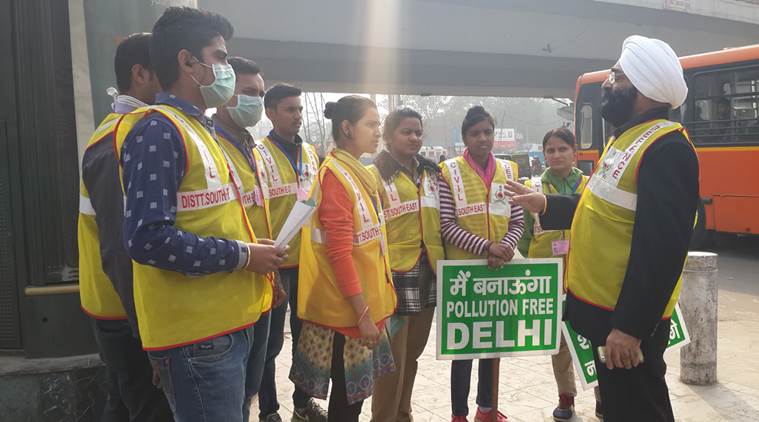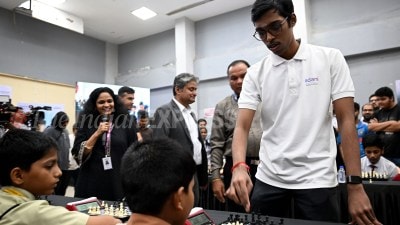Stay updated with the latest - Click here to follow us on Instagram
Eyes on the odds: A day in the life of a volunteer working to implement Delhi’s odd-even policy
Nagma Abbasi, 21, is among the people you see on the roads of Delhi these days, handing out roses to traffic violators, ensuring people follow rules
 Nagma Abbasi works for an NGO and is on a 15-day leave so that she can volunteer for the 15-day odd-even programme.
Nagma Abbasi works for an NGO and is on a 15-day leave so that she can volunteer for the 15-day odd-even programme.
She holds a large placard that says, “Main banaoonga pollution-free Delhi (I will make Delhi pollution-free)”. The gender in the slogan is incorrect, but Nagma Abbasi has larger things to worry about. The 21-year-old — her hair streaked golden, shoes a glittery pink — is among the 5,700 volunteers with the Civil Defence unit, a relief and response group of the government, deployed across different spots in the Capital to ensure smooth implementation of the Delhi government’s “odd-even scheme”, a road rationing policy in force from January 1 to 15.
She is on duty at Ashram Chowk, a busy four-way intersection in southeast Delhi, along with 15 fellow volunteers, all wearing flourscent yellow jackets with ‘Civil Defence’ written in bold. The team, which includes five women, reports to 51-year-old “senior warden” Swarn Singh, who is in charge of the signal. There are 16 other senior wardens in southeast Delhi, all supervising different traffic junctions.
The shift begins at 7 am, with a roll-call of the volunteers and Singh ticking off their names on a sheet. A volunteer has not turned up today. “He is unwell,” says a boy in the group. The team then splits into four groups of 3 to 4 members, each sent to one of the four different points at the junction. Singh monitors the team from a vantage point, shifting his position from time-to-time.
 Volunteers are the people you see on the roads of Delhi these days, handing out roses to traffic violators, ensuring people follow rules.
Volunteers are the people you see on the roads of Delhi these days, handing out roses to traffic violators, ensuring people follow rules.
A “businessman”, Singh says he joined the Civil Defence unit five years ago after hearing an ad on radio. “Many of my family members are in the defence forces and I always wanted to do some service for the country,” he says. Singh, along with the other wardens, was trained at the Raja Garden headquarters of the unit.
At 8 am, when the odd-even scheme kicks in, the volunteers begin their work. It’s January 6, an even-numbered day, and Abbasi is looking out for cars whose number plates do not end in 0, 2, 4, 6 or 8. Half an hour later and with no defaulter yet, she says, “It’s the sixth day of the drive and I guess people have got used to it.”
Spotting defaulters is not a simple task, she says. “We have to be careful before stopping a car. We first see the number, then check whether the driver is a woman or a man and finally look out for the CNG sticker,” says Abbasi, adding that she knows “the 25 exemptions by heart”.
A DU graduate, she lives in Sarai Kale Khan with her mother and a sister, who runs a beauty parlour. Her father died when she was a child.
Abbasi works for an NGO and is on a 15-day leave so that she can volunteer for the 15-day odd-even programme.
During her nine-hour shift, Abbasi, besides spotting defaulters, also distributes pamphlets that give out details of the policy, ensures all cars and bikes are behind the stop-line and talks to commuters about the need to check pollution.
The volunteers were trained for three days on what to do at the signals and told to do a few physical exercises, “given that we have to stand for eight-nine hours every day,” says Neetu Rajput, 22, Abbasi’s “buddy” — Civil Defence jargon for team-mates.
Ten minutes past 9 am, as the traffic picks up, Abbasi spots an odd-numbered white Wagon R behind a cluster of vehicles at the traffic signal. She swiftly walks through the traffic in an attempt to reach the car. But halfway through, she stops after spotting a CNG sticker on the car. “With the sun in this direction it was difficult to see the sticker,” she smiles.
So have the commuters been cooperative over the last six days? “Initially, some were difficult to handle. They would pretend to speak on their phones when we spoke to them, but now most have been listening to us,” says Rajput.
The Civil Defence volunteers are not allowed to fine or stop vehicles. They simply walk up to the defaulters and “explain to them that what they are doing is wrong”. “We started by giving them roses, but that turned out to be too expensive, so now we just try and persuade them to return. If they don’t listen and drive past us, the traffic policemen are there to stop and fine them,” says Singh, who has “no political affiliations” and would have volunteered “even if the BJP was in power”. “I am not sure if the scheme can be permanent, but it should be definitely imposed for 15 days in a month,” he says.
Abbasi, who has now moved to the other side of the road with Rajput, feels the “scheme should be made permanent”. “Even women should not be exempted. Standing here for six days has given me a sore throat. I wonder how bad the condition is in the rest of the city,” she says, adding that “AAP has taken the right step and I would like to join the party some day”.
The volunteers have been given masks to wear during their shifts, but she is not wearing hers today. “The plastic edges of the mask hurt my nose,” says Abbasi, who is Rs 457 a day for volunteering for the scheme.
By 11.30 am, the team has distributed over a 100 pamphlets and “counselled” about 20 commuters about the benefits of the scheme. Pointing to a few male volunteers who have been sitting on a mound near their point, Abbasi says “girls are more vigilant and hard-working”. “Look at them. They even refuse to hold the placard, handing it to the girls,” she says.
During the shift, Singh moves between the four points and ensures that all the volunteers are “alert” and gets updates on defaulters. “I think the Rs 2,000 fine is keeping defaulters at bay,” he says.
The traffic policemen at the site, who have just stopped a Fortuner with an odd number, don’t agree. “This driver just handed me the fine and drove away. He was from Maharani Bagh next door. What is Rs 2,000 for rich people like them? It is the middle-class who find the fine heavy and so they stick to the rules,” says traffic constable Sanjay Kumar.
The Civil Defence volunteers, he feels, have helped in implementing the scheme. “When young volunteers stop drivers and confront them, they feel embarrassed and turn back. It’s a psychological thing. If a policeman like me stops them, they often retaliate and say, ‘Janta hai main kaun hoon (Do you know who I am)’,” says Kumar, who hands a bottle of water and a cup of tea to Abbasi.
It’s noon and Abbasi is yet to take a break. “I try to drink less water and sometimes I use the public toilet a few metres away,” she smiles. She steps forward every few minutes to ask cars and bikes to stay behind the line and raises her left hand to let cyclists through. “Driving on the roads is tough for cyclists. A 50-year-old man who rides to work every day took a selfie with us yesterday and thanked us for clearing the lane for him,” she says.
Abbasi says senior citizens are most pleased with the implementation of the scheme. “When we go and hand out pamphlets to senior citizens, they listen attentively and even say that the air is better these days,” she says.
At 10 minutes past 1, a few members of the next shift start trickling in. All of them are men, since women are not assigned the evening shift. Their shift officially begins at 3 pm, but they arrive early so that members of the morning shift can take a lunch break.
Abbasi’s team-mates go in groups of 2-3 and eat hot aloo naans and sabzi from a nearby pushcart. The volunteers remove their Civil Defence jackets while eating lunch “so that people don’t get the impression that we are avoiding work”.
As her shift ends, Abbasi is happy that there were few defaulters today. “This means that the scheme is working. There were just two challans,” she says. Ready to board bus number 422 to get home, she removes her jacket, but keeps the pink Civil Defence card hanging around her neck. “The conductors don’t ask for ticket fare when they see this,” she says, hopping on to the bus.







